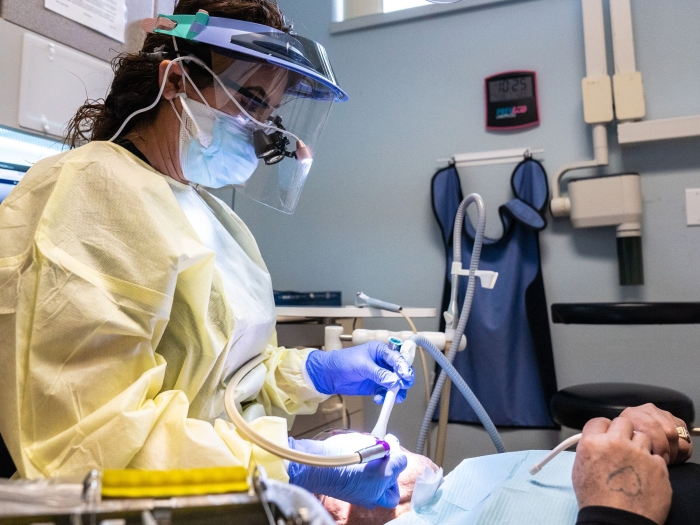A new mouse and human tissue study identifies an enzyme critical for normal wound healing
2:42 PM
Author |

For the average person, getting a cut or scrape on the foot may not be cause for immediate concern. However, for people with type 2 diabetes, these wounds can be life-threatening. According to a 2016 study, one-third of the cost of type 2 diabetes treatment is related to non-healing diabetic foot wounds and ulcers, which are the leading cause of amputation in the United States.
"This is a major clinical problem," says Katherine Gallagher, M.D., vascular surgeon and an Associate Professor in Michigan Medicine's Departments of Surgery and Microbiology/Immunology. "Most people don't realize that if someone has a major amputation due to a non-healing wound, they have only a 50 percent survival rate at three years, which is actually worse than most cancers."
LISTEN UP: Add the new Michigan Medicine News Break to your Alexa-enabled device, or subscribe to our daily updates on iTunes, Google Play and Stitcher.
In a new paper in the journal Immunity, Gallagher, first authors Andrew Kimball, M.D. and Frank Davis, M.D., and their colleagues describe for the first time an enzyme that seems to be critical for normal healing—and, in diabetic patients, appears to be missing. The discovery also hints at a possible treatment.
Steps to healing
It all starts with the immune system and cells called macrophages. During normal healing, an injury triggers the immune system to release monocytes in the blood which travel to the site of damaged tissue and become macrophages. At first, these macrophages create an inflammatory response to engulf and eliminate any bacteria or other pathogens. These same macrophages then change into a non-inflammatory repair mode to generate new tissue and promote healing. With diabetes, this conversion never takes place and inflammation persists.
Gallagher's team suspected that something environmental triggered epigenetic changes that prevented the macrophages from completing their job. "Type 2 diabetes typically develops over 20 to 30 years, and while genetics certainly play a role, we speculated that behaviors such as smoking or a long-term unhealthy diet were causing permanent epigenetic changes in the cells," she says. Epigenetics refers to changes in gene expression that do not come from changes from the underlying DNA sequence.
[W]e speculated that behaviors such as smoking or a long-term unhealthy diet were causing permanent epigenetic changes in the cells.Katherine Gallagher, M.D.
Using mice and human tissues, they discovered for the first time that an epigenetic enzyme called Setdb2 regulates the conversion of macrophages from an inflammatory type to a repair type. In diabetic mice, Setdb2 did not increase at the critical time and their wounds remained inflamed.
Potential treatment
Gallagher's team also found that Setdb2 appears to be a player in the metabolism of uric acid, known to be elevated in people with diabetes. People with high blood concentrations of uric acid can develop gout, which can cause painful inflamed joints. Gallagher and her team found that in normal healing, Setdb2 turns off xanthine oxidase, the enzyme that produces uric acid. In doing so, Setdb2 turns off inflammation. To see whether blocking uric acid could help wound healing, the team administered allopurinol, a common drug used to treat gout and kidney stones, locally to wound sites in their diabetic mouse models.
MORE FROM MICHIGAN: Sign up for our weekly newsletter
"The drug seemed to improve healing," says Gallagher. "Our data looks very promising for using this as a local therapy."
Applying allopurinol directly to the wounds, she adds, could help avoid some of the toxic systemic side effects associated with the drug. The team hopes to eventually bring their findings to clinical trials, look for other inflammatory genes that may be targets, and explore ways of increasing Setdb2 for cell-based therapy.
Paper cited: Kimball, A.S., Davis, F.M., et al. "The Histone Methyltransferase Setdb2 Modulates Macrophage Phenotype and Uric Acid Production in Diabetic Wound Repair" Immunity. DOI: 10.1016/j.immuni.2019.06.015

Explore a variety of healthcare news & stories by visiting the Health Lab home page for more articles.

Department of Communication at Michigan Medicine
Want top health & research news weekly? Sign up for Health Lab’s newsletters today!





